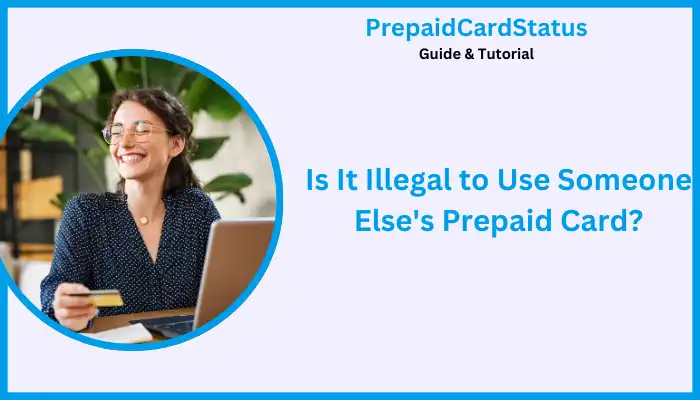The common question arises that “Is it illegal to use someone else’s prepaid card?“, as prepaid cards continue growing in popularity for their flexibility and convenience. Whether used for online shopping, travel expenses, or gift-giving, these cards offer a simple way to manage spending without needing a traditional bank account – but their ease of use also creates important legal considerations
However, unauthorized use can lead to fraud charges, fines, or even jail time. To avoid legal issues, it’s always a good practice to check the PrepaidCardStatus login and ensure you are authorized to use the card before making any transactions.
In this blog, we’ll explore the legal implications of using someone else’s prepaid card, the potential consequences of unauthorized use, and how to avoid legal trouble.

Is Using Someone Else’s Prepaid Card Illegal?
The legality of using another person’s prepaid card depends on two primary factors: consent and intent.
1. Using a Prepaid Card With Permission
If you use someone else’s prepaid card with their explicit consent, it is not illegal. For example:
- A friend lending you their prepaid card for a specific purchase.
- A parent giving their child access to a prepaid card.
- A shared family card used by multiple authorized users.
In these cases, the transaction is lawful because no fraudulent intent is involved.
Key Considerations:
- Clear consent is necessary.
- Proof of permission may be useful in case of disputes.
2. Using a Prepaid Card Without Permission
However, is it illegal to use someone else’s prepaid card? without their knowledge Yes, unauthorized use is considered illegal. Even if you intend to return the card or repay the money, using it without permission can lead to theft or fraud charges.
Legal Consequences of Unauthorized Use:
Some of the legal consequences of unauthorized use:
- Theft charges: Using a prepaid card without permission is considered theft, even if the card was not physically stolen.
- Fraud charges: Making purchases with someone else’s card without their consent can lead to fraud accusations.
- Fines and penalties: Depending on the amount spent, you could face significant fines or imprisonment.
| Unauthorized Use | Potential Legal Consequence |
|---|---|
| Using without permission | Theft or fraud charges |
| Large unauthorized purchases | Felony charges (in some jurisdictions) |
| Using a stolen prepaid card | Criminal offense with severe penalties |
3. Borrowing vs. Stealing: Knowing the Difference
There is a fine line between borrowing and stealing when it comes to prepaid cards:
- Borrowing: Using the card with the owner’s knowledge and permission.
- Stealing: Taking or using the card without consent, which is illegal.
Simply put, using someone else’s prepaid card without consent is illegal, while authorized use is generally lawful.
Risks of Using a Lost or Stolen Prepaid Card
If you knowingly use a stolen or lost prepaid card, you could face serious legal repercussions.
1. Criminal Charges
Using a stolen prepaid card can lead to charges such as:
- Credit card fraud: Even though prepaid cards are not credit cards, unauthorized use is still considered fraud.
- Identity theft: If the card contains identifiable information, you could be charged with identity theft.
- Felony or misdemeanor: Large transactions may result in felony charges, while smaller unauthorized purchases may be classified as misdemeanors.
2. Financial Consequences
If caught using someone else’s prepaid card, you may be ordered to:
- Pay restitution to the card owner.
- Reimburse stolen funds.
- Cover legal fees and fines.
3. Long-Term Impact
Criminal charges related to prepaid card fraud can result in:
- Permanent criminal record.
- Difficulty securing loans or employment.
- Loss of financial trustworthiness.
Using a stolen or lost prepaid card is a criminal offense with long-lasting consequences.
How to Avoid Legal Issues With Prepaid Cards?
To ensure you stay on the right side of the law, follow these simple guidelines.
1. Only Use Cards With Clear Permission
If you’re unsure whether it is illegal to use someone else’s prepaid card?, it’s best to seek explicit permission. When in doubt, avoid using the card altogether.
2. Keep Proof of Consent
If you frequently use another person’s prepaid card (e.g., a shared family card), keep a written or digital record of consent. This can help protect you in case of legal disputes.
3. Use Your Own Prepaid Card
To avoid any legal confusion, it’s best to use your own prepaid card. Reloadable prepaid cards are widely available and provide the flexibility you need without legal risks.
| Tip | Why It Matters |
|---|---|
| Always obtain consent | Prevents unauthorized use accusations |
| Keep proof of permission | Protects you in legal disputes |
| Use your own card | Avoids legal risks entirely |
By following these precautions, you can avoid legal issues related to prepaid card use.
Conclusion
So, is it illegal to use someone else’s prepaid card? The answer depends on consent and intent. Using another person’s prepaid card with their permission is generally lawful. However, unauthorized use—even if accidental—can lead to fraud, theft charges, and financial penalties.
To stay safe, always obtain clear consent before using someone else’s card, keep proof of permission for shared cards, and use your own prepaid card to avoid legal complications. By understanding the legal implications, you can use prepaid cards responsibly and avoid unnecessary legal risks.
